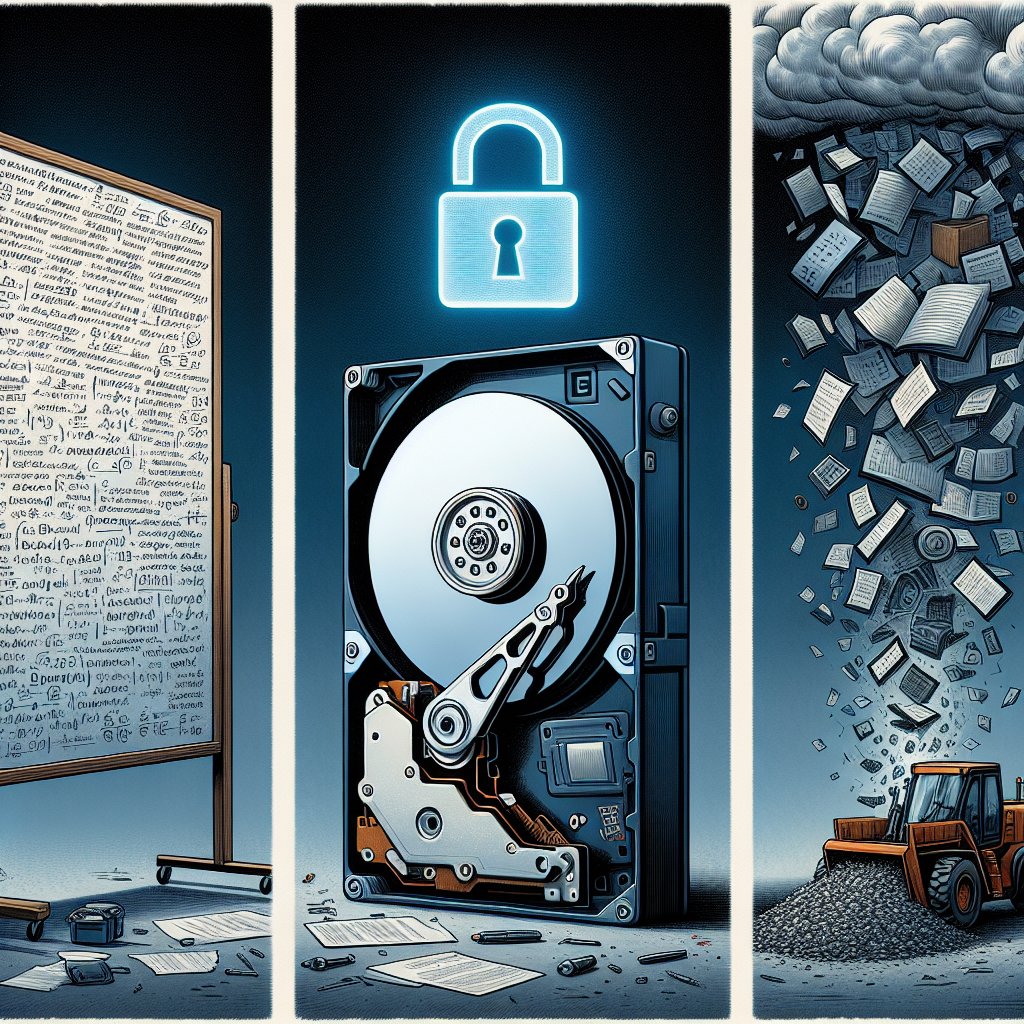Are Deleted Files Actually Deleted?We live in an era where our lives depend on our digital data and respositories. From cherished memories captured in photos and videos to crucial financial documents and confidential work files, our digital footprint grows larger by the day. But what happens when those files vanish? You hit the delete button, empty the Recycle Bin, and breathe a sigh of relief, believing the unwanted data is gone for good. But is it really? The answer might surprise you.
The Illusion of Deletion: Deconstructing the “Delete” Button

Many assume that hitting the “delete” button erases a file from existence, like wiping clean a whiteboard. However, the reality is far more nuanced. Your computer operates on the principle of efficiency, and immediately erasing data every time you hit “delete” would be a time-consuming and resource-intensive process. Instead, your operating system employs a clever trick.
Imagine your computer’s storage as a vast library with millions of books, each representing a file. When you delete a file, it’s like removing the book’s card from the library catalog. The book itself remains on the shelf, but it’s no longer listed as available. Similarly, when you delete a file, your operating system doesn’t immediately erase the data. Instead, it simply marks the space occupied by that file as available for new data. The file’s content persists until overwritten by new information, much like how a book remains on the shelf until replaced by another.
Are Deleted Files Actually Deleted? The Answer: Not Quite
So, are deleted files actually deleted? The short answer is no, not immediately. When you delete a file, you’re essentially just removing the signpost that tells your computer where to find it. The data itself remains on your hard drive, hidden from view but still very much present. This is why data recovery is often possible – specialized software can scan your hard drive, locate these “deleted” files, and recover them.
Data Recovery: Shining a Light on the Invisible World of “Lost” Files
Data recovery tools act as digital detectives, meticulously combing through your hard drive for traces of deleted files. They analyze the hard drive’s structure, identify data remnants, and piece together fragmented information like a jigsaw puzzle, often reconstructing deleted files with remarkable accuracy.
Think of it like this: imagine a detective arriving at a crime scene. The evidence might seem gone at first glance, but with careful observation and specialized tools, the detective can uncover fingerprints, DNA traces, and other hidden clues that reveal the sequence of events. Similarly, data recovery experts use specialized software and techniques to unearth the “digital fingerprints” left behind by deleted files, piecing together the fragments to reconstruct the lost data.
Accidental Deletion? Don’t Panic! Data Recovery to the Rescue
The good news is that even if you haven’t taken any special precautions, there’s a good chance you can recover accidentally deleted files. As long as the space on your hard drive hasn’t been overwritten by new data, data recovery tools can often retrieve those seemingly lost files.
Data Recovery Software: Your Digital First Aid Kit for Data Disasters
Numerous data recovery software options are available, ranging from freeware tools with basic functionality to professional-grade applications packed with advanced features. The choice depends on your needs, technical expertise, and the complexity of the data loss situation.
Here are some popular data recovery tools:
- Recuva: A user-friendly freeware tool for Windows that can recover various file types from hard drives, memory cards, and other storage devices.
- EaseUS Data Recovery Wizard: A comprehensive data recovery solution for Windows and macOS, offering a range of recovery options and support for various file systems.
- Disk Drill: A powerful data recovery tool available for macOS and Windows, known for its intuitive interface and advanced recovery capabilities.
Ensuring Permanent Deletion: When Are Deleted Files Truly Gone?
While data recovery is a godsend for accidental deletions, it presents a significant concern when you need to permanently erase sensitive information. Situations like selling your computer, disposing of storage devices, or protecting confidential data demand a more secure approach than simply emptying the Recycle Bin.
Going Beyond Simple Deletion: Methods for Secure Data Erasure

To ensure your data is truly irrecoverable, consider these robust methods:
- Data Overwriting: Specialized software can overwrite the deleted files with random data multiple times, making the original information practically irretrievable. This process is akin to erasing a whiteboard with a marker and then writing over it repeatedly, rendering the initial content illegible.
- Disk Encryption: Encrypting your entire drive adds a robust layer of security by transforming your data into an unreadable format without the decryption key. Even if someone attempts data recovery, they’ll only encounter a jumbled mess of encrypted information, rendering it useless.
- Physical Destruction: For the ultimate data security, physical destruction of the storage device is the most foolproof method. This could involve shredding the hard drive, drilling holes through it, or using specialized services for secure data destruction. While effective, this method renders the storage device unusable.
Data Recovery: A Double-Edged Sword in the Digital Age
Understanding the nuances of data recovery empowers you to manage your digital information effectively. While it offers a safety net for accidental deletions, it also necessitates proactive measures to ensure the permanent removal of sensitive data. By employing secure deletion methods and understanding the limitations of simple deletion, you can strike a balance between data accessibility and data security.
Need Expert Help with Data Recovery or Secure Deletion? Contact Mr IT!
Navigating the complexities of data recovery and secure deletion can be daunting. If you’re facing data loss or need to ensure the complete erasure of sensitive information, don’t hesitate to contact Mr IT. Our team of experts can provide reliable and confidential assistance, guiding you through the intricacies of data recovery and secure deletion, ensuring your data is handled with the utmost care and security.
If you need further assistance please give us a call at 03 9087 4389
